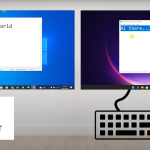Table of Contents
Introduction | SSD and HDD
In today’s digital age, the storage drive you choose for your computer can significantly impact your computing experience. With the emergence of Solid State Drives (SSDs) and traditional Hard Disk Drives (HDDs), users are faced with a crucial decision that could transform their daily interactions with technology.
Understanding SSDs and HDDs
Explanation of SSD (Solid State Drive)
SSDs are storage devices that use flash memory to keep data persistently. Unlike HDDs, SSDs have no moving parts, which results in faster data access times and improved overall performance.
Explanation of HDD (Hard Disk Drive)
HDDs, on the other hand, rely on spinning disks or platters to store data magnetically. These mechanical components make HDDs slower in comparison to SSDs.
Speed and Performance of SSD and HDD
SSDs: Faster data access and boot times
SSDs excel in speed and performance, offering lightning-fast data access and significantly reduced boot times for operating systems and applications.
HDDs: Slower performance compared to SSDs
HDDs are relatively slower due to their mechanical nature, resulting in longer wait times for data retrieval and application loading.
Capacity and Cost
SSDs: Limited capacity, higher cost per GB
While SSDs offer impressive performance, they typically come with limited storage capacity and a higher cost per gigabyte compared to HDDs.
HDDs: Higher capacity, lower cost per GB
HDDs boast larger storage capacities at a lower cost per gigabyte, making them a more economical choice for users with extensive storage needs.
Durability and Reliability
SSDs: No moving parts, less prone to physical damage
The absence of moving parts in SSDs makes them more durable and less susceptible to physical damage caused by shocks or vibrations.
HDDs: Mechanical components, susceptible to damage from shocks and vibrations
HDDs contain mechanical components that are vulnerable to damage from external forces, potentially leading to data loss or drive failure.
Power Consumption
SSDs: Lower power consumption, ideal for laptops and mobile devices
SSDs consume less power than HDDs, making them an ideal choice for laptops, tablets, and other battery-powered devices where energy efficiency is crucial.
HDDs: Higher power consumption, suitable for desktops and servers
HDDs typically consume more power, making them better suited for desktop computers and server environments where power usage may not be as critical.
Noise and Heat
SSDs: Silent operation, generate less heat
Due to their lack of moving parts, SSDs operate silently and generate minimal heat during use, contributing to a quieter and cooler computing environment.
HDDs: Audible noise, produce more heat
HDDs produce audible noise as the spinning disks move, and they generate more heat compared to SSDs, which can lead to higher operating temperatures within a computer system.
Use Cases and Recommendations
SSDs: Best for performance-oriented tasks, gaming, and high-speed data access
SSDs are ideal for users who prioritize performance, such as gamers and professionals working with large datasets or multimedia files that require fast data access.
HDDs: Suitable for mass storage, backups, and archival purposes
HDDs are well-suited for users seeking ample storage space for mass storage, backups, and archival purposes where performance may not be the primary concern.
Factors to Consider When Choosing Between SSD and HDD
When deciding between an SSD and an HDD, several factors should be taken into account, including budget constraints, performance requirements, and storage needs.
Impact on Computing Experience
The choice between an SSD and an HDD can significantly impact the overall computing experience, influencing factors such as speed, reliability, and power efficiency.
Future Trends and Developments
As technology continues to evolve, both SSDs and HDDs are expected to undergo further advancements, with SSDs likely to become more affordable and HDDs potentially incorporating new technologies to improve performance and reliability.
Case Studies
Real-world examples demonstrate how organizations and individuals have benefited from adopting SSDs or HDDs based on their specific use cases and requirements.
Tips for Making the Right Choice
Consulting with experts and assessing personal needs and preferences are essential steps in making an informed decision when choosing between an SSD and an HDD.
Conclusion
In conclusion, the decision between SSD and HDD is a crucial one that can have a significant impact on your computing experience. By considering factors such as speed, capacity, durability, and cost, users can make an informed choice that aligns with their specific needs and preferences.
FAQs
- What is the main difference between SSD and HDD?
- The main difference lies in their technology; SSDs use flash memory for storage, while HDDs rely on spinning disks.
- Are SSDs more expensive than HDDs?
- Yes, SSDs are generally more expensive per gigabyte compared to HDDs due to their faster performance and advanced technology.
- Can I use both SSD and HDD in the same computer?
- Yes, many computers support both SSD and HDD storage options, allowing users to benefit from the speed of an SSD for their operating system and applications while using an HDD for additional storage.
- How long do SSDs and HDDs typically last?
- SSDs have a limited lifespan based on the number of write cycles, but modern SSDs can last for several years under normal usage. HDDs also have a lifespan but are generally more susceptible to mechanical failure over time.
- Which is better for gaming, SSD or HDD?
- SSDs are typically better for gaming due to their faster data access times, which result in shorter loading times and smoother gameplay experiences.
Check out our article – Cracking the Code: How the MERN Stack World Changing Revolutionizes Web Development in 2023









